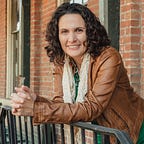Why Women Are Opting Out of Religion
People who identify as ‘nones,’ or nonreligious, are one of the fastest-growing groups in America
Deirdre Sugiuchi was five when her dad became a born-again Christian. She grew up bouncing between Mississippi churches: Baptist, Methodist, Presbyterian Church in America. (“The hardcore version,” she says.) They attended twice a day on Sundays, each Wednesday, plus any revival. She went to school at segregation academies, and had to fight with her father to be allowed to wear pants.
Sugiuchi attended a Focus on the Family-associated church camp where she was taught how to write letters to influence members of Congress. She describes her father’s version of discipline, corporal punishment during which he’d quote scripture — spare the rod, spoil the child. Despite a beating that was bad enough she couldn’t go to school for a new days, no one intervened. “I was told there was something wrong with me. But I was being brutalized and nobody was saying anything about it,” she says.
Despite being sent to an abusive Christian reform school due to her “rebellion,” she still considered herself a Christian into her early twenties and tried to attend church. Sugiuchi, who is now 47, says she realized church just didn’t do anything for her anymore. “It wasn’t any one thing; it was this gradual falling away. And then over this past decade it’s been such a toxic thing,” she adds.
Sugiuchi sees followers using their Christianity to justify being anti-gay, anti-Black, and anti-woman. George W. Bush’s rhetoric around the war on terror made her hyperaware of how Christian nationalism has been used to promote a racist ideology. “I feel like until this past year, people haven’t understood the problem we face with people who call themselves Christians,” she says.
She doesn’t use terms like “atheist” or “agnostic” to describe her belief system. She says she no longer believes in an anthropomorphic God, and recognizes that religion has been used throughout history as a tool of the state to justify oppressing people. I asked if she had grown up in a more moderate, mainline church environment if she might have held onto her faith. She’s not sure, but imagines she would have left the church regardless. She’s close to people…
